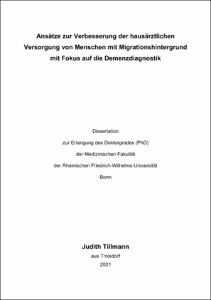Tillmann, Judith: Ansätze zur Verbesserung der hausärztlichen Versorgung von Menschen mit Migrationshintergrund mit Fokus auf die Demenzdiagnostik. - Bonn, 2021. - Dissertation, Rheinische Friedrich-Wilhelms-Universität Bonn.
Online-Ausgabe in bonndoc: https://nbn-resolving.org/urn:nbn:de:hbz:5-62379
Online-Ausgabe in bonndoc: https://nbn-resolving.org/urn:nbn:de:hbz:5-62379
@phdthesis{handle:20.500.11811/9093,
urn: https://nbn-resolving.org/urn:nbn:de:hbz:5-62379,
author = {{Judith Tillmann}},
title = {Ansätze zur Verbesserung der hausärztlichen Versorgung von Menschen mit Migrationshintergrund mit Fokus auf die Demenzdiagnostik},
school = {Rheinische Friedrich-Wilhelms-Universität Bonn},
year = 2021,
month = may,
note = {People with a migration background represent more than a quarter of the German population and are increasingly at risk of suffering from dementia due to demographic change. Diagnosing dementia depends on language skills, cultural backgrounds, knowledge and access of patients to the healthcare system. Although general practitioners (GPs) hold a key role in diagnosing dementia in Germany, it is unknown whether they face challenges and are in need of support to interact with patients with a migration background. In addition, the access of people with a migration background to GP services is unclear. This thesis aims to address these gaps in research. A cross-sectional survey in a random sample of 339 GPs in North Rhine Westphalia (NRW) was conducted from October 2017 to January 2018 (response rate: 34.5 %). A self-developed, standardized questionnaire was used to gather GPs’ experience in diagnosing dementia and analysed performing descriptive and multiple logistic regression analyses. The connection of a migration background and further factors and having no GP was analysed among the 7755 participants of the representative “German Health Interview and Examination Survey for Adults”. Descriptive analyses and multiple logistic regression models were conducted. A share of 96 % of GPs reported having experienced barriers in diagnosing dementia in their patients with a migration background at least once. Uncertainties in this field were stated by 70.9 % with no significant association to GPs’ sociodemographic characteristics. Language barriers (89.3 %), information deficits (59.2 %) and shameful interaction or lack of acceptance of the syndrome (55.5 %) on the part of patients were reported most frequently. A demand for information on the topic was expressed by 70.6 % of GPs. In DEGS1, an increased share of 14.8 % of people with a migration background had no GP, especially those with a two-sided background (aOR: 1.90, 95 % CI: 1.42–2.55). To prevent unequal health opportunities, GPs should be supported in providing healthcare and especially in performing dementia diagnostics in their patients with a migration background. Intercultural opening of the healthcare system through language and culturally sensitive information, intercultural competence training of GPs and a focus in politics and research could be useful to improve healthcare.},
url = {https://hdl.handle.net/20.500.11811/9093}
}
urn: https://nbn-resolving.org/urn:nbn:de:hbz:5-62379,
author = {{Judith Tillmann}},
title = {Ansätze zur Verbesserung der hausärztlichen Versorgung von Menschen mit Migrationshintergrund mit Fokus auf die Demenzdiagnostik},
school = {Rheinische Friedrich-Wilhelms-Universität Bonn},
year = 2021,
month = may,
note = {People with a migration background represent more than a quarter of the German population and are increasingly at risk of suffering from dementia due to demographic change. Diagnosing dementia depends on language skills, cultural backgrounds, knowledge and access of patients to the healthcare system. Although general practitioners (GPs) hold a key role in diagnosing dementia in Germany, it is unknown whether they face challenges and are in need of support to interact with patients with a migration background. In addition, the access of people with a migration background to GP services is unclear. This thesis aims to address these gaps in research. A cross-sectional survey in a random sample of 339 GPs in North Rhine Westphalia (NRW) was conducted from October 2017 to January 2018 (response rate: 34.5 %). A self-developed, standardized questionnaire was used to gather GPs’ experience in diagnosing dementia and analysed performing descriptive and multiple logistic regression analyses. The connection of a migration background and further factors and having no GP was analysed among the 7755 participants of the representative “German Health Interview and Examination Survey for Adults”. Descriptive analyses and multiple logistic regression models were conducted. A share of 96 % of GPs reported having experienced barriers in diagnosing dementia in their patients with a migration background at least once. Uncertainties in this field were stated by 70.9 % with no significant association to GPs’ sociodemographic characteristics. Language barriers (89.3 %), information deficits (59.2 %) and shameful interaction or lack of acceptance of the syndrome (55.5 %) on the part of patients were reported most frequently. A demand for information on the topic was expressed by 70.6 % of GPs. In DEGS1, an increased share of 14.8 % of people with a migration background had no GP, especially those with a two-sided background (aOR: 1.90, 95 % CI: 1.42–2.55). To prevent unequal health opportunities, GPs should be supported in providing healthcare and especially in performing dementia diagnostics in their patients with a migration background. Intercultural opening of the healthcare system through language and culturally sensitive information, intercultural competence training of GPs and a focus in politics and research could be useful to improve healthcare.},
url = {https://hdl.handle.net/20.500.11811/9093}
}






